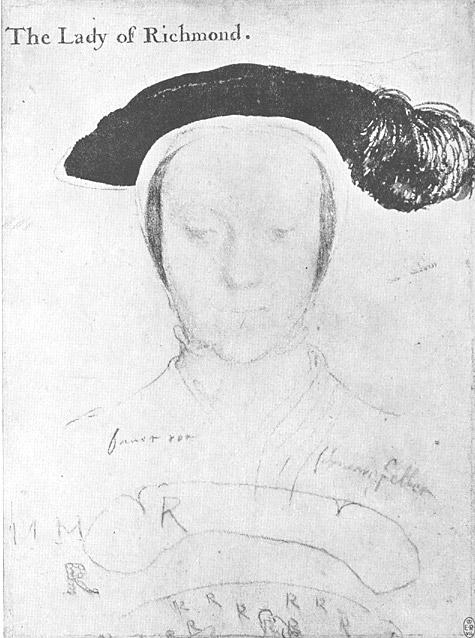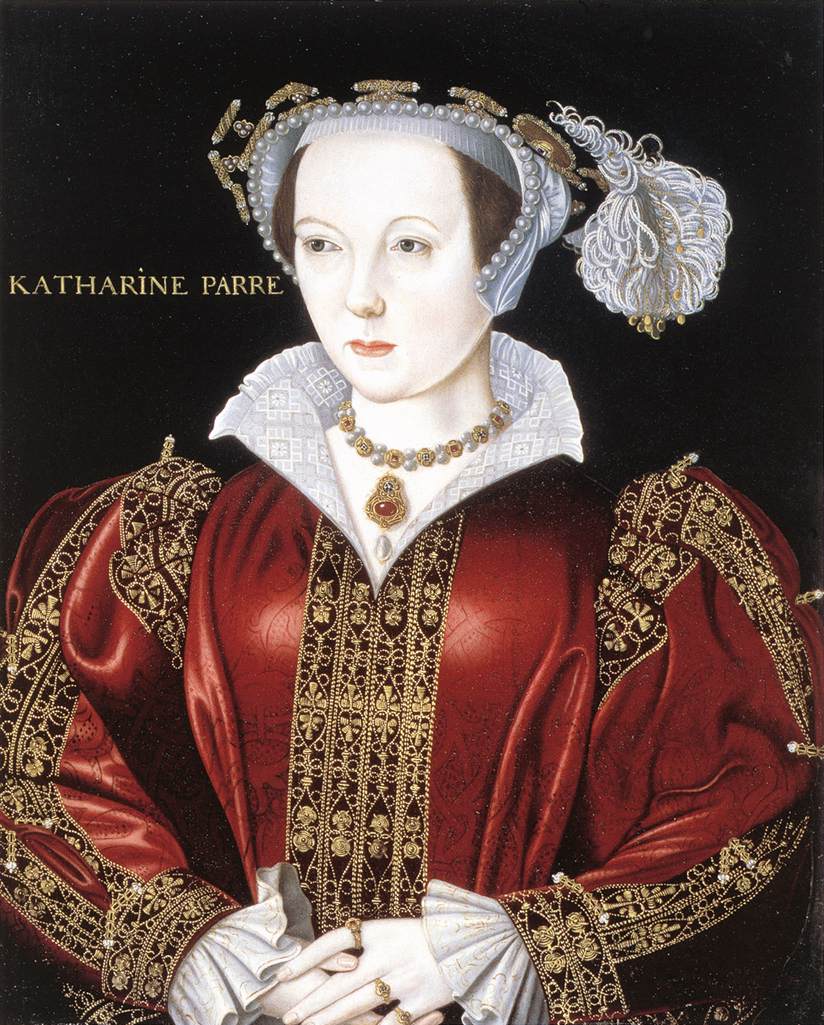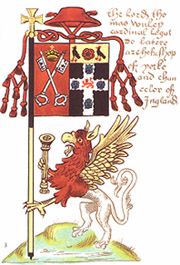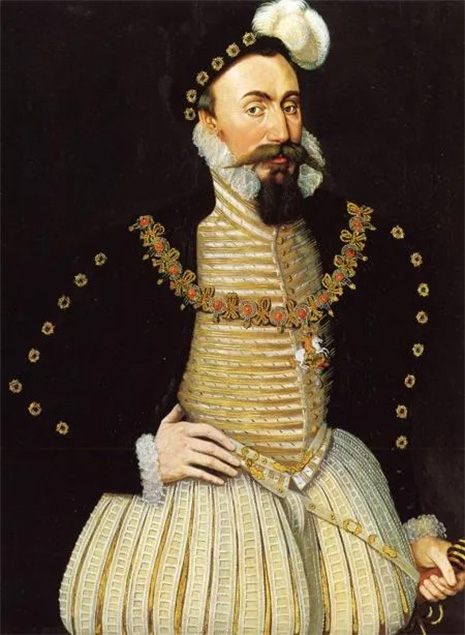



 |
| An etching of Lady Richmond |
 |
| Catherine Parr appears to wear a Beret on top of her bejewelled hood |
 |
| Like father, like son - Edward VI wearing a Beret in the same style as Henry VIII |
 Cardinal Wolsey's personal coat of arms is now that of the Christ Church which he founded. Like the one beneath it is crowned with a Cardinal's hat though a black one. Wolsey was born in Suffolk and as such he has symbols belonging to the nobles of that shire. The silver cross is from the Uffolk Earls of Suffolk while the four blue leopards from both the Dukes of Suffolk and the de la Pole Earls. Notice the Tudor rose topping all this as a reference to Henry VIII and his house of Tudor. The red lion is the chosen emblem of Pope Leo X who was Wolsey's patron. The two black birds are derived from Thomas à Becket's coat of arms.
Cardinal Wolsey's personal coat of arms is now that of the Christ Church which he founded. Like the one beneath it is crowned with a Cardinal's hat though a black one. Wolsey was born in Suffolk and as such he has symbols belonging to the nobles of that shire. The silver cross is from the Uffolk Earls of Suffolk while the four blue leopards from both the Dukes of Suffolk and the de la Pole Earls. Notice the Tudor rose topping all this as a reference to Henry VIII and his house of Tudor. The red lion is the chosen emblem of Pope Leo X who was Wolsey's patron. The two black birds are derived from Thomas à Becket's coat of arms.None may be burnt without some of the Council's presence and good sermons at the same.According to British Express the Marian Persecutions differ from every other series of persecutions in England's history because it had no political background. Instead it was all about religious beliefs and not really an attempt to strengthen Mary's position as Queen. Also, the Marian Persecutions are by far the ones that feature the horrible death of being burned alive at the stake - it had never happened as frequently nor would again than during this time which just added to the terror. It should also be remembered that though Mary I is generally stated to have had about 300 (288 to be exact) people killed during her reign this is "just" during the persecutions - this number does NOT count the ones executed after the Wyatt Rebellion for example which counted for another 200. The fact that all these executions took place within two years (the persecutions ended in 1557) is most likely one of the main reasons for why this period is remembered as being so bloody.
 |
| The executions of the Oxford Martyrs during the persecutions |
 |
| BBC's list of the martyrs burned by Mary (link) |
 |
| The tomb of Henry VII and Elizabeth of York |
 |
| Henry VIII hunting on the Morning of Anne Boleyn's Execution |
Master Coulpeper,
I hertely recomend me unto youe praying you tosende me worde how that you doo. Yt was showed me that you wassike, the wyche thynge trobled me very muche tell suche tyme that Ihere from you praying you to send me worde how that you do.For I never longed so muche for [a] thynge as I do to se you andto speke wyth you, the wyche I trust shal be shortely now, thewyche dothe comforthe me verie much whan I thynk of ett andwan I thynke agan that you shall departe from me agayneytt makes my harte to dye to thynke what fortune I havethat I cannot be always yn your company. Y[e]t my trust ysallway in you that you wolbe as you have promysed meand in that hope I truste upon styll, prayng you than thatyou wyll com whan my lade Rochforthe ys here, for thenI shalbe beste at leaysoure to be at your commarendmant.Thaynkyng you for that you have promysed me to be sogood unto that pore felowe my man, whyche is on of thegrefes that I do felle to departe from hym for than I doknow noone that I dare truste to sende to you and therforI pray you take hym to be wyth you that I may sumtymhere from you one thynge. I pray you to gyve me a horsefor my man for I hyd muche a do to gat one andthefer I pray sende me one by hym and yn so doying Iam as I sade afor, and thus I take my leve of youtrusting to se you s[h]orttele agane and I wode you waswythe me now that yoo maitte se what pane I takeyn wryte[n]g to you.
Yours as long aslyffe endures
Katheryn
One thyng I had forgotten andthat hys to instruct my man to tare here wyt[h] me still, for hesas wat so mever you bed hym he wel do et and [...]
.png) |
| First page |
.png) |
| Second page |
Sir, your Grace's displeasure, and my imprisonment are things so strange unto me, as what to write, or what to excuse, I am altogether ignorant; whereas you sent unto me (willing me to confess a truth, and so obtain your favour) by such a one, whom you know to be my ancient and professed enemy; I no sooner received the message by him, than I rightly conceived your meaning; and if, as you say, confessing truth indeed may procure my safety, I shall with all willingness and duty perform your command. But let not your Grace ever imagine that your poor wife will ever be brought to acknowledge a fault, where not so much as thought thereof proceeded. And to speak a truth, never Prince had wife more loyal in all duty, and in all true affection, than you have found in Anne Bullen, with which name and place could willingly have contented my self, as if God, and your Grace's pleasure had been so pleased. Neither did I at any time so far forge my self in my exaltation, or received Queenship, but that I always looked for such an alteration as now I find; for the ground of my preferment being on no surer foundation than your Grace's fancy, the least alteration, I knew, was fit and sufficient to draw that fancy to some other subject.
You have chosen me, from a low estate, to be your Queen and companion, far beyond my desert or desire. If then you found me worthy of such honour, good your Grace, let not any light fancy, or bad counsel of mine enemies, withdraw your Princely favour from me; neither let that stain, that unworthy stain of a disloyal heart towards your good Grace, ever cast so foul a blot on your most dutiful wife, and the infant Princess your daughter:
Try me, good King, but let me have a lawful trial, and let not my sworn enemies sit as my accusers and judges; yes, let me receive an open trial, for my truth shall fear no open shame; then shall you see, either mine Innocency cleared, your suspicion and conscience satisfied, the ignominy and slander of the world stopped, or my guilt openly declared. So that whatsoever God or you may determine of me, your Grace may be freed from an open censure; and mine offence being so lawfully proved, your Grace is at liberty, both before God and Man, not only to execute worthy punishment on me as an unlawful wife, but to follow your affection already settled on that party, for whose sake I am now as I am, whose name I could some good while since have pointed unto: Your Grace being not ignorant of my suspicion therein.
But if you have already determined of me, and that not only my death, but an infamous slander must bring you the enjoying of your desired happiness; then I desire of God, that he will pardon your great sin therein, and likewise mine enemies, the instruments thereof; that he will not call you to a strict account for your unprincely and cruel usage of me, at his general judgment seat, where both you and my self must shortly appear, and in whose judgment, I doubt not, (whatsover the world may think of me) mine innocence shall be openly known, and sufficiently cleared.
My last and only request shall be, that my self may only bear the burthen of your Grace's displeasure, and that it may not touch the innocent souls of those poor gentlemen, who (as I understand) are likewise in strait imprisonment for my sake. If ever I have found favour in your sight; if ever the name of Anne Bullen hath been pleasing to your ears, then let me obtain this request; and I will so leave to trouble your Grace any further, with mine earnest prayers to the Trinity to have your Grace in his good keeping, and to direct you in all your actions.
Your most Loyal and ever Faithful Wife, Anne Bullen
From my doleful prison in the Tower, this 6th of May.
 |
| Cromwell's execution on "the Tudors" |
 |
| Henry Grey, Duke of Suffolk |
 |
| Astley Castle |